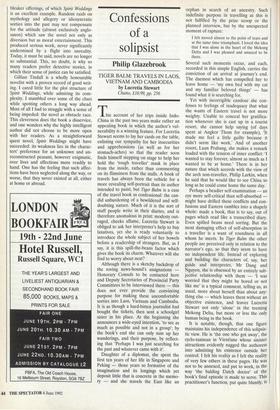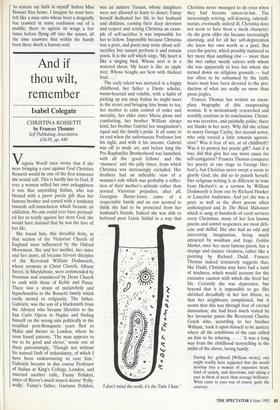Confessions of a solipsist
Philip Glazebrook
TIGER BALM: TRAVELS IN LAOS, VIETNAM AND CAMBODIA by Lucretia Stewart Chatto, £10.99, pp. 256 This account of her trips inside Indo- China in the past two years make rather an appealing book in which the author's vul- nerability is a winning feature. For Lucretia Stewart seems to lay her cards on the table, enlisting our sympathy for her insecurities and apprehensions (as well as for her stomach-aches) so that the reader soon finds himself stepping on stage to help her hold the 'tough traveller' mask in place from the inside, rather than commenting on its flimsiness from the stalls. A book of travels has always been the vehicle for a more revealing self-portrait than its author intended to paint, but Tiger Balm is a case of the travel book as confessional: the can- did unburdening of a bewildered and self- doubting nature. Much of it is the sort of stuff people write in their diaries, and is therefore anomalous in print: modesty out- raged, cheeks aflame, Lucretia Stewart is obliged to ask her interpreter's help to buy laxatives, yet she is ready voluntarily to introduce the whole subject of her bowels before a readership of strangers. But, as I say, it is this spill-the-beans factor which gives the book its charm. Whatever will she find to worry about next?
Although there is a sketchy backdrop of the roving news-hound's assignations Honorary Consuls to be contacted here and Deputy Secretaries of Provincial Party Committees to be interviewed there — this does not ever provide the convincing purpose for making these uncomfortable sorties into Laos, Vietnam and Cambodia. It is as though a hard-bitten journalist had bought the tickets, then sent a schoolgirl sister in his place. At the beginning she announces a wide-eyed intention, 'to see as much as possible and not in a group'; by the book's end she can only sum up her wanderings, and their purpose, by reflect- ing that 'Perhaps I was just searching for the past and whatever came with it'.
Daughter of a diplomat, she spent the first ten years of her life in Singapore and Peking — those years so formative of the imagination and its longings which yet deposit little that is concrete in the memo- ry — and she travels the East like an
orphan in search of an ancestry. Such indefinite purpose in travelling as this is not fulfilled by the prize scoop or the planned interview, but by the unexpected moment of rapture:
I felt moved almost to the point of tears and at the same time triumphant. I loved the idea that I was alone in the heart of the Mekong Delta and I was pleased and amazed to be there.
Several such moments occur, and each, recorded in this simple English, carries the conviction of an arrival at journey's end. The daemon which has compelled her to leave home — 'my own bed with my cat and my familiar beloved things' — has found what it is searching for.
Yet with incorrigible candour she con- fesses to feelings of inadequacy that what she wants of Eastern travel is not more weighty. Unable to conceal her gratifica- tion whenever she is cast up in a tourist resort, she cannot help saying (of days spent at Angkor Thom for example), 'It made me feel a little guilty because it didn't seem like work.' And of another resort, Luan Prabang, she makes a remark loaded with the tension of inner conflict: 'I wanted to stay forever, almost as much as I wanted to be at home.' There is in her nature that which accords with the view of the arch non-traveller, Philip Larkin, when he said that he would like to see China so long as he could come home the same day.
Perhaps a beadier self-examination — an eye more self-critical than self-absorbed might have drilled these conflicts and con- fusions and Eastern rambles into a shapely whole: made a book, that is to say, out of pages which read like a transcribed diary. Even spilled beans need sorting. But the most damaging effect of self-absorption in a traveller is a want of roundness in all whom he meets. In Tiger Balm the other people are perceived only in relation to the narrator's ego, so that they seem to have no independent life. Instead of exploring and building the characters of, say, her guide and interpreter, Mr Dang and Nguyen, she is obsessed by an entirely sub- jective relationship with them — 'I was worried that they might be bored or not like me' is a typical comment, telling us, as usual, more about herself than about any- thing else — which leaves them without an objective existence, and leaves Lucretia Stewart not only 'alone' in the teeming Mekong Delta, but more or less the only human being in the book.
It is notable, though, that one figure maintains his independence of this solipsis- tic view. He is 'the one who got away', the cyclo-taximan in Vientiane whose sinister attractions evidently nagged the authoress into admitting his existence outside her control. I felt his reality as I felt the reality of very few others in these pages. He was not to be annexed, and put to work, in the way 'the balding Dutch doctor' of the book's final episode is made to serve. This practitioner's function, put quite bluntly, is
'to restore my faith in myself' before Miss Stewart flies home. I imagine he must have felt like a man onto whose boot a dragonfly has crawled in some confusion out of a puddle, there to agitate its wings a few times before flying off into the sunset, all the time unaware that within the handy boot there dwelt a human soul.



































































 Previous page
Previous page